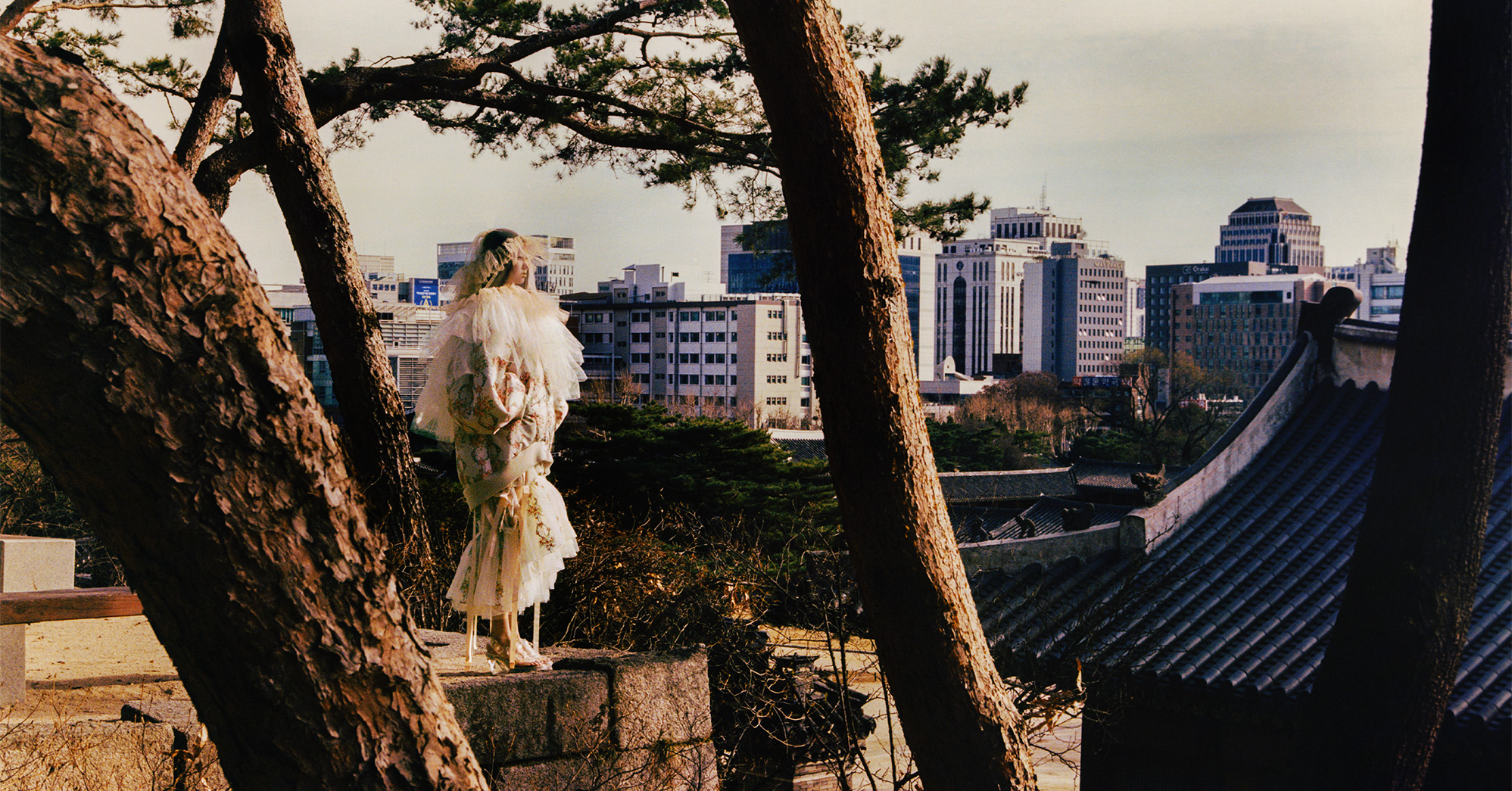ON THE HORIZON
At Changgyeong Palace—erected by the exalted King Sejong in the mid-15th century—model Yoon Young Bae looks out over northern Seoul in a densely ruffled Simone Rocha jacket, skirt (simonerocha.com), veil, and shoes. Fashion Editor: Kate Phelan. Photographed by Cho Gi-Seok
MODERN LOVE
As Cho Gi-Seok pays homage to his own photograph in Dazed Korea last year, Soo Yeon wears a Boss jacket and pants; hugoboss.com. Hyung Joon wears a Dolce & Gabbana trench coat and jumpsuit; dolcegabbana.com. Photography by Cho Gi Seok
Seoul is tomorrowland, teeming with models, actors, activists, and musicians who are breaking molds and leaning into what’s now and what’s next. Monica Kim takes stock of a brave new world.
What is it about Seoul that has the world in its thrall? I have fielded this question so often of late, tossed it back and forth, particularly with Koreans, as puzzled as I am by the sudden fervor. The Seoul of the ’90s that I knew as a child—as an American girl growing up in the Midwest, my mother taking me twice a year to the country of her birth—was rooted in smallness. Seoul was the pack of yogurt drink left swinging on my grandmother’s front door, the windowless market where we’d buy sticky rice cakes, the underground hall where fake Chanel wallets tumbled from black garbage bags like stone fruit from trees. It felt like a stunted city yearning for sophistication. My American classmates could not place it on a map. “Is it like Beijing? Tokyo?” they would ask. “North or South Korea?”
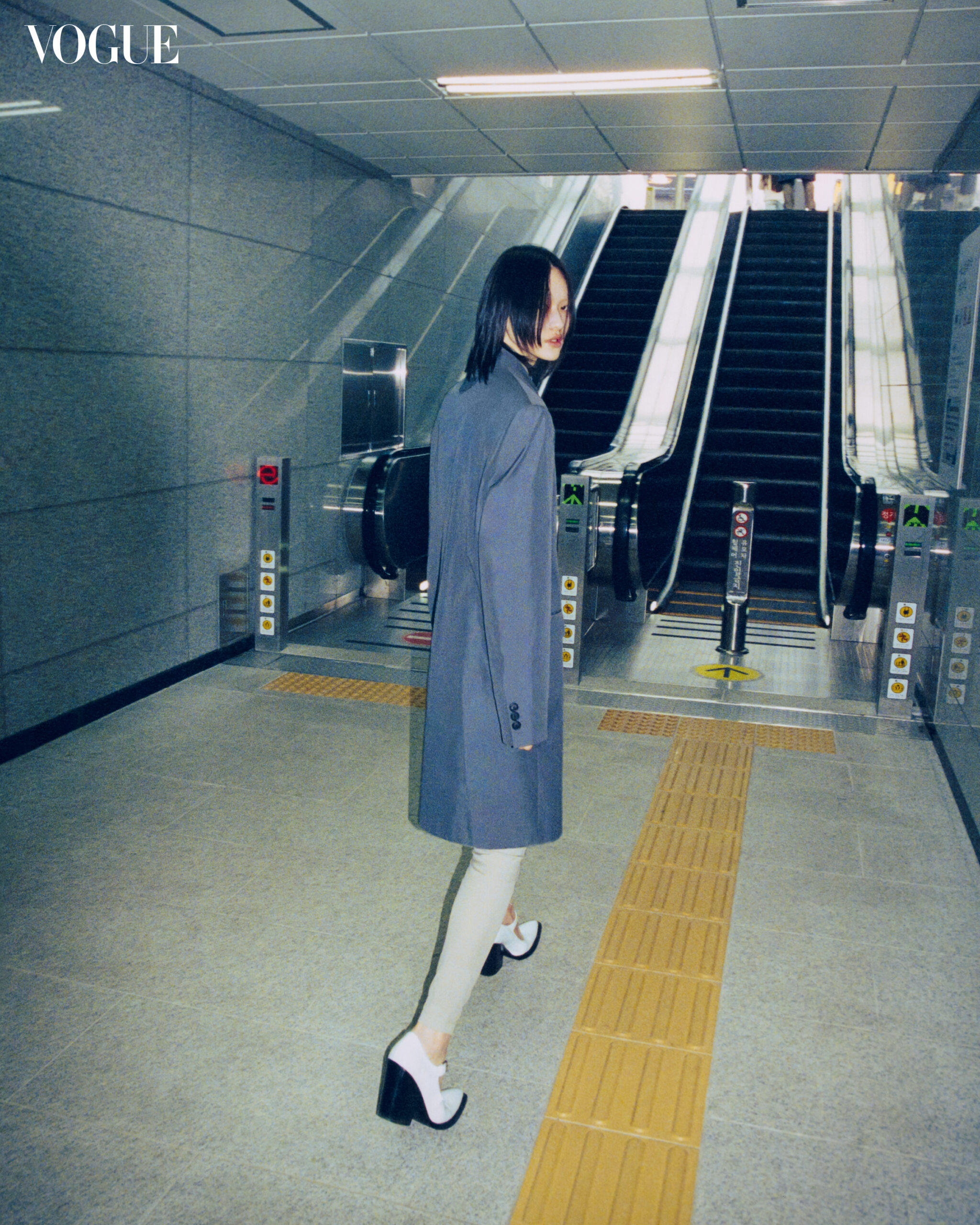
Stepping lightly through Yeoksam Station in dynamic Gangnam, model Chloe Oh cuts a very sharp figure in a Prada coat, pants, and shoes; prada.com. Photography by Cho Gi Seok
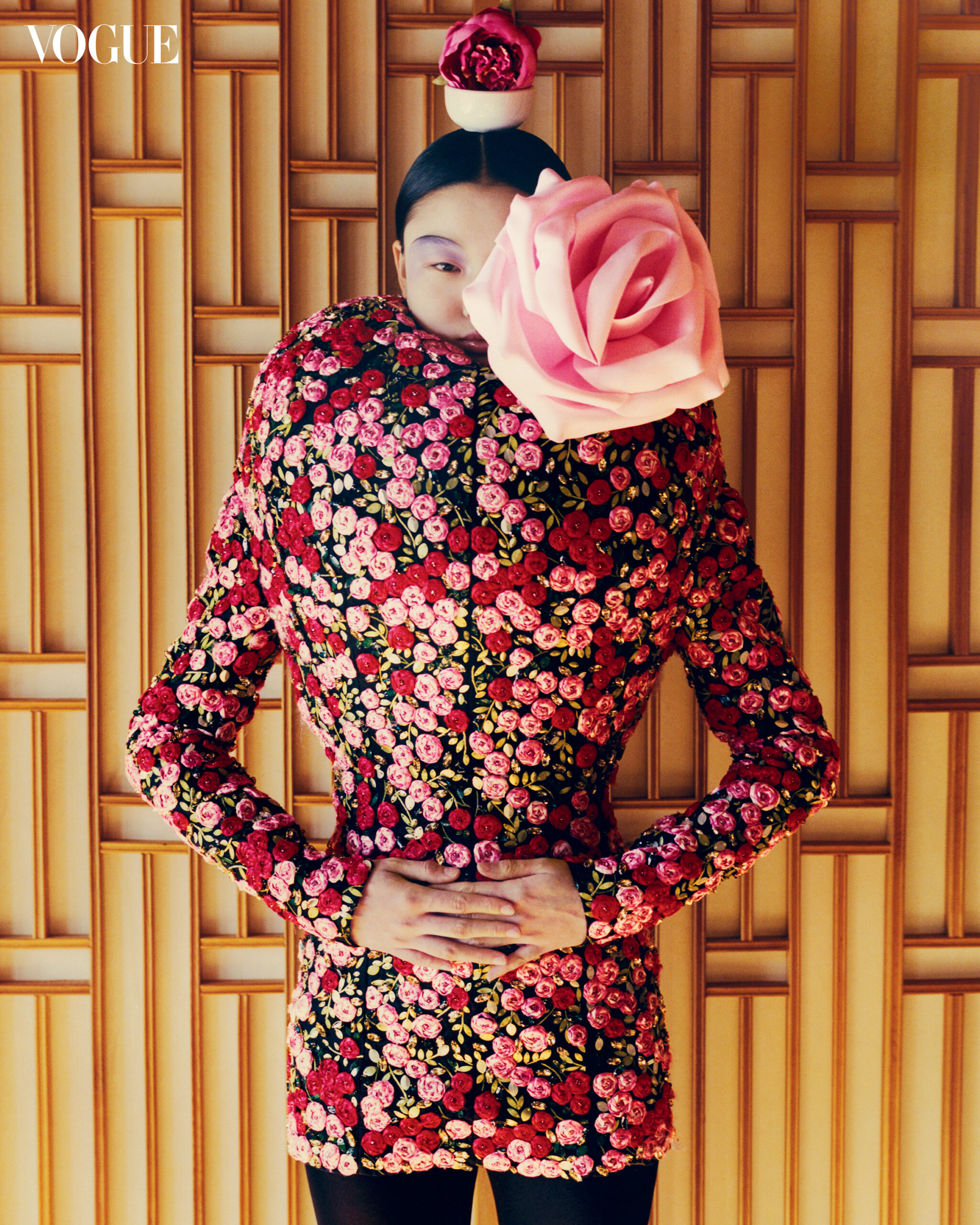
Framed by the splendid interiors of the Korea Furniture Museum, Yoon Young Bae pumps up the volume in a sculptural Richard Quinn dress; richardquinn.com. Photography by Cho Gi Seok
As I entered my teens, I began to dread the prospect of flying 14 hours for dull department store lunches and walks along an ever-gray river. I craved the worldliness of New York, or Paris, or Tokyo, and wanted to own a real Chanel wallet instead of a convincing fake. Immature, I thought that Seoul lacked savoir vivre, and said so to my mother, who acquiesced and we ceased our yearly visits. The city faded from my view.
When I returned in the 2010s, I didn’t recognize what I saw. Young men and women roved along picturesque avenues, sharply dressed in Vetements, eyes fixed on smartphones. I revisited old haunts, relishing the visual feast—and when I started working as an editor for US Vogue, I covered Seoul’s emerging designers and cultural figures. I noticed my fellow editors following Korean fashion labels, my friends streaming my mother’s favorite Korean soap operas. One winter, in the West Village, a blond woman in yoga pants tapped my shoulder in the checkout line at a posh butcher’s shop on Hudson Street, pointing at the jar of kimchi in my hand. “You know that’s spicy, right?” Seoul had officially become cool.
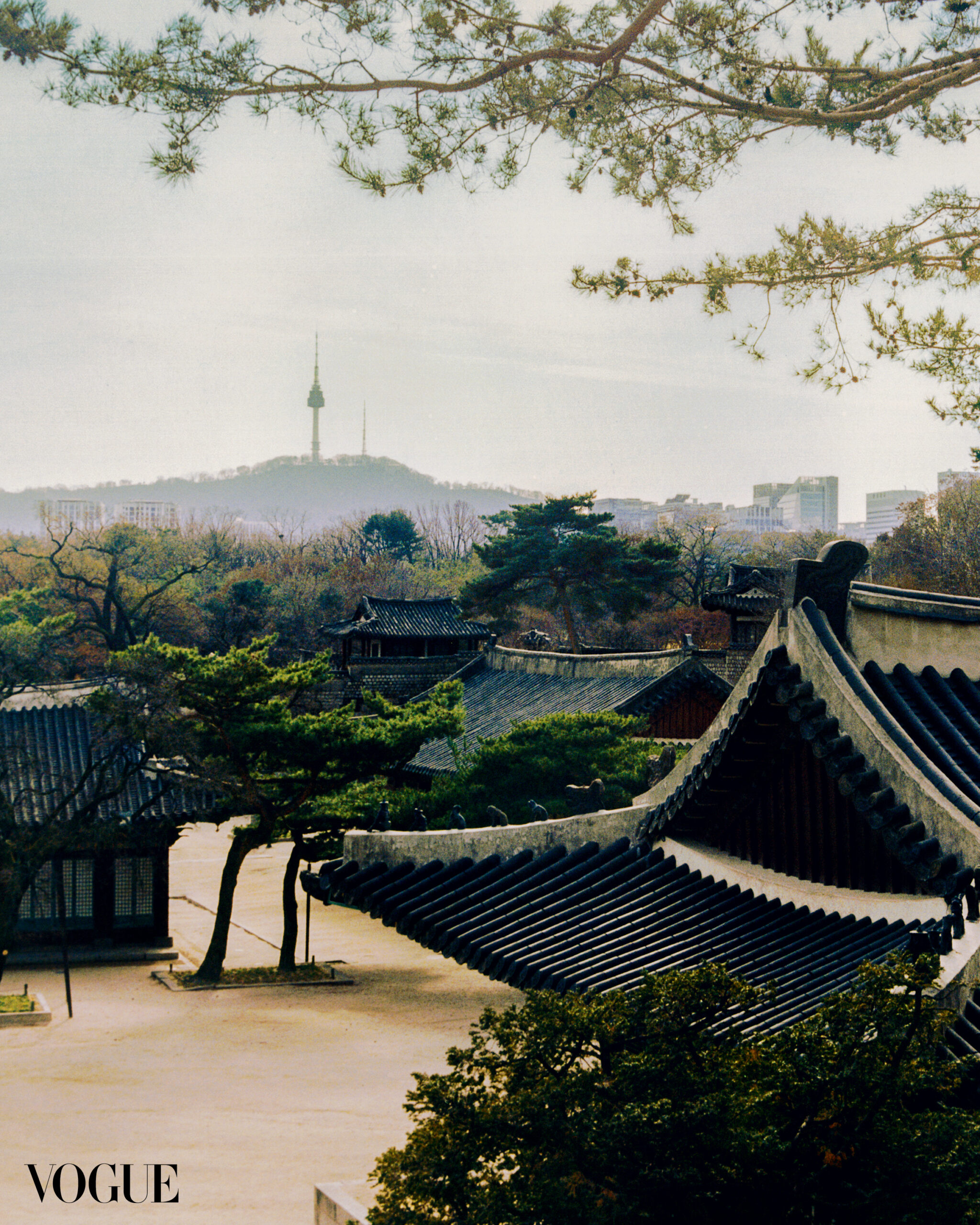
Another glimpse of Changgyeong Palace in historic Jongno, with sweeping views of more recent developments to the east. Photography by Cho Gi Seok
The stunning flash of photographs that spills across this portfolio speaks to Vogue’s fascination with the pace of Seoul’s transformation: in fashion, beauty, music, film, art, and technology. I can attest to all of it. Three years ago, I moved to Seoul full-time for work, and though I was accustomed to Manhattan’s long hours, the city quickly consumed me. My colleagues feverishly clocked 20-hour shifts, accomplishing impossible tasks five times a day, and there was barely time to sleep. Seoul was an engine running at unfathomable speed, exhausting and exhilarating. Yet that momentum has given birth to a new school of iconoclasm: artists and actors, models and singers, who were shaped and driven by the pressure, but have also broken with it—finding ways to stand out, express who they are, and cut against the sheen of glossy perfectionism that has defined Korean pop culture in the past.
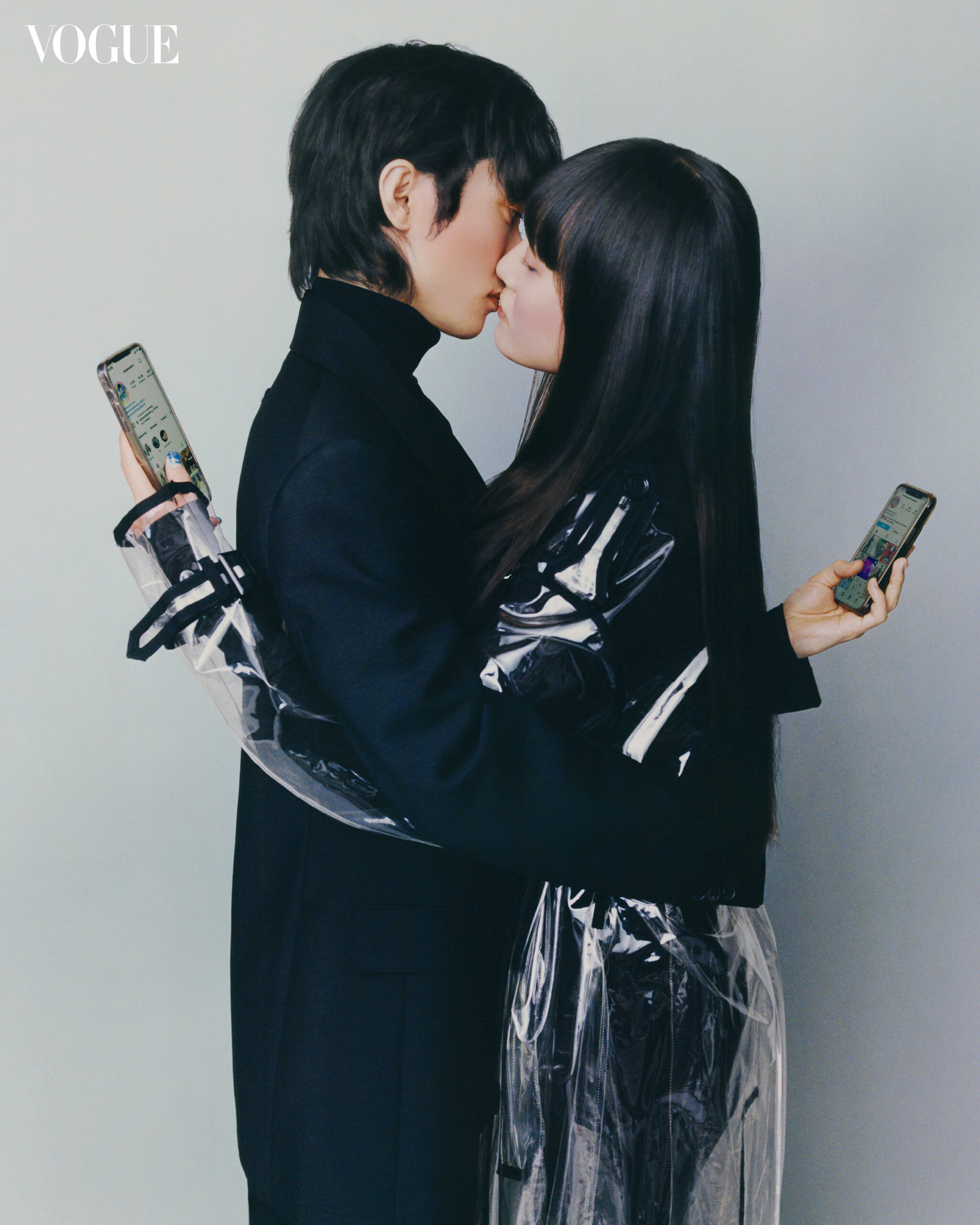
As Cho Gi-Seok pays homage to his own photograph in Dazed Korea last year, Soo Yeon wears a Boss jacket and pants; hugoboss.com. Hyung Joon wears a Dolce & Gabbana trench coat and jumpsuit; dolcegabbana.com. Photography by Cho Gi Seok
The personalities in these images represent a new stage of evolution. Take Balming Tiger: an alternative and fully independent K-pop collective that is set apart by its diverse roster of 11 multifaceted young artists; or Jungle, an activist who last summer launched Transparent, a party series to celebrate and uplift transgender people. Beloved actress Doona Bae, who has staunchly pursued her craft for more than two decades, has become a role model for young actors who eschew the overt trappings of superstardom; so has producer Code Kunst, whose lack of pretension and quiet passion for composition have made him an unlikely heartthrob.
Even NewJeans, the chart-burning idol girl group that debuted last summer, are singular in that they emerge from a label with a female CEO, Min Hee Jin, a rarity in the industry. With NewJeans, there are no corsets or ball gowns, no overbleached extensions or stiletto nails. Just five high school–aged girls playing themselves, with black, hip-length hair, singing and dancing to ’90s-style teen pop with exuberant smiles. As NewJeans’s Hanni tells me, the label’s goal was authenticity. “Because at the end of the day, we’re the ones standing onstage.” “It’s such an honor to be able to express ourselves,” adds her co-idol Danielle. Small steps toward progress can feel the most profound.
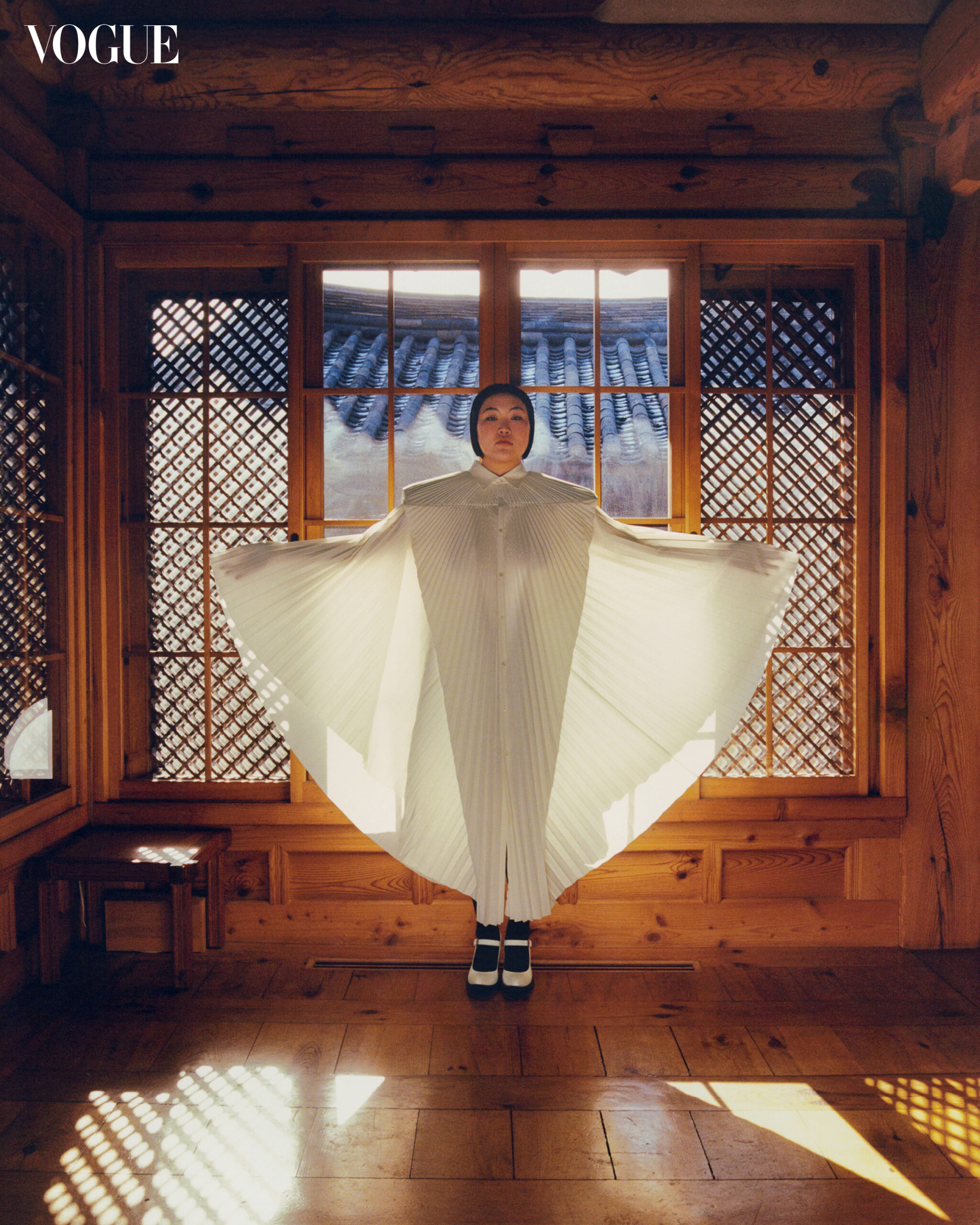
An almost celestial vision in her many-pleated Junya Watanabe dress (shop.doverstreetmarket.com), model Britney Kim conjures the Winged Victory of Samothrace in one of the Korea Furniture Museum’s light-flooded rooms. Photography by Cho Gi Seok
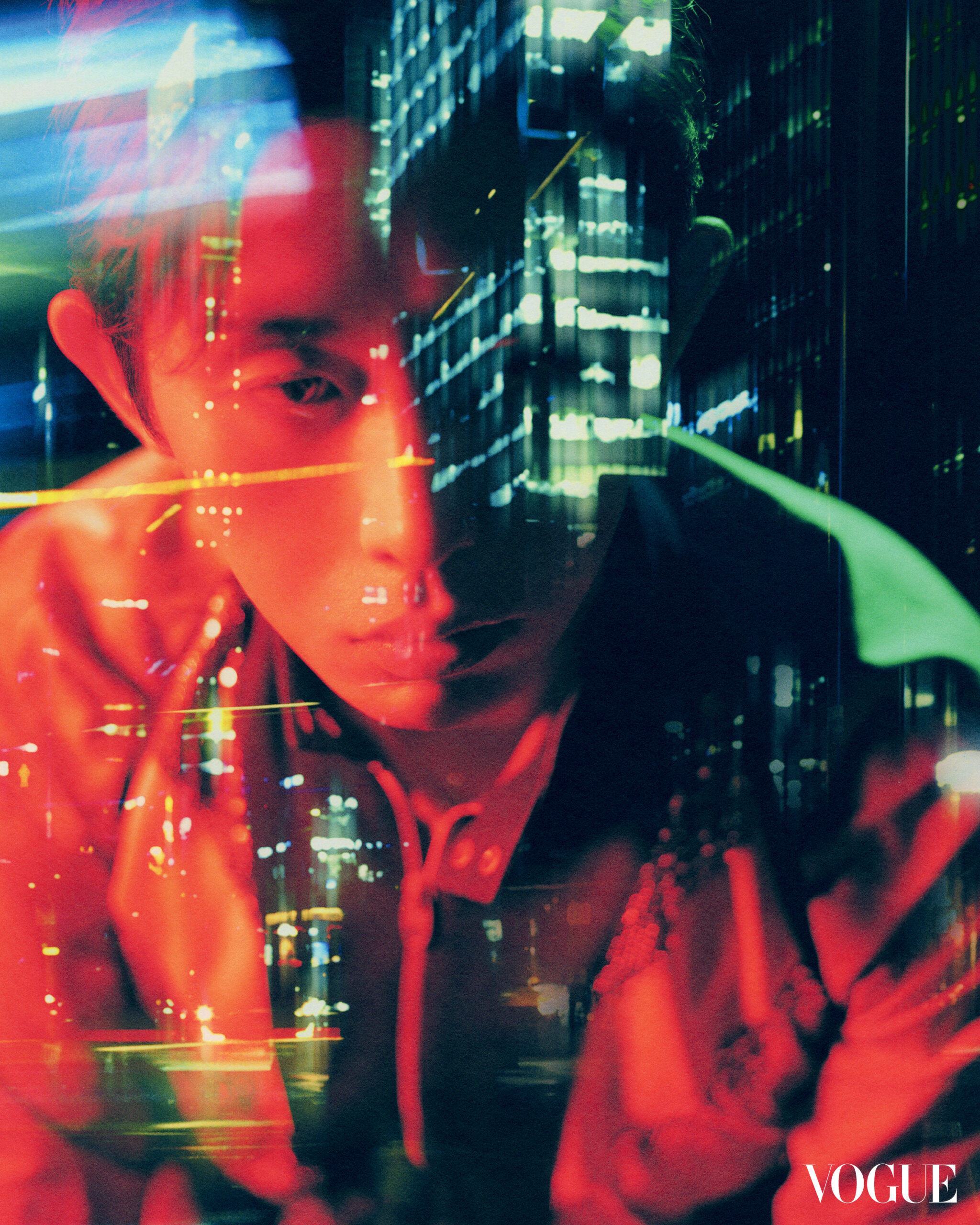
Producer Code Kunst is on the vanguard of Seoul’s music scene. He surveys the thronging Jonggak Station intersection in a Gucci jacket; gucci.com. Photography by Cho Gi Seok
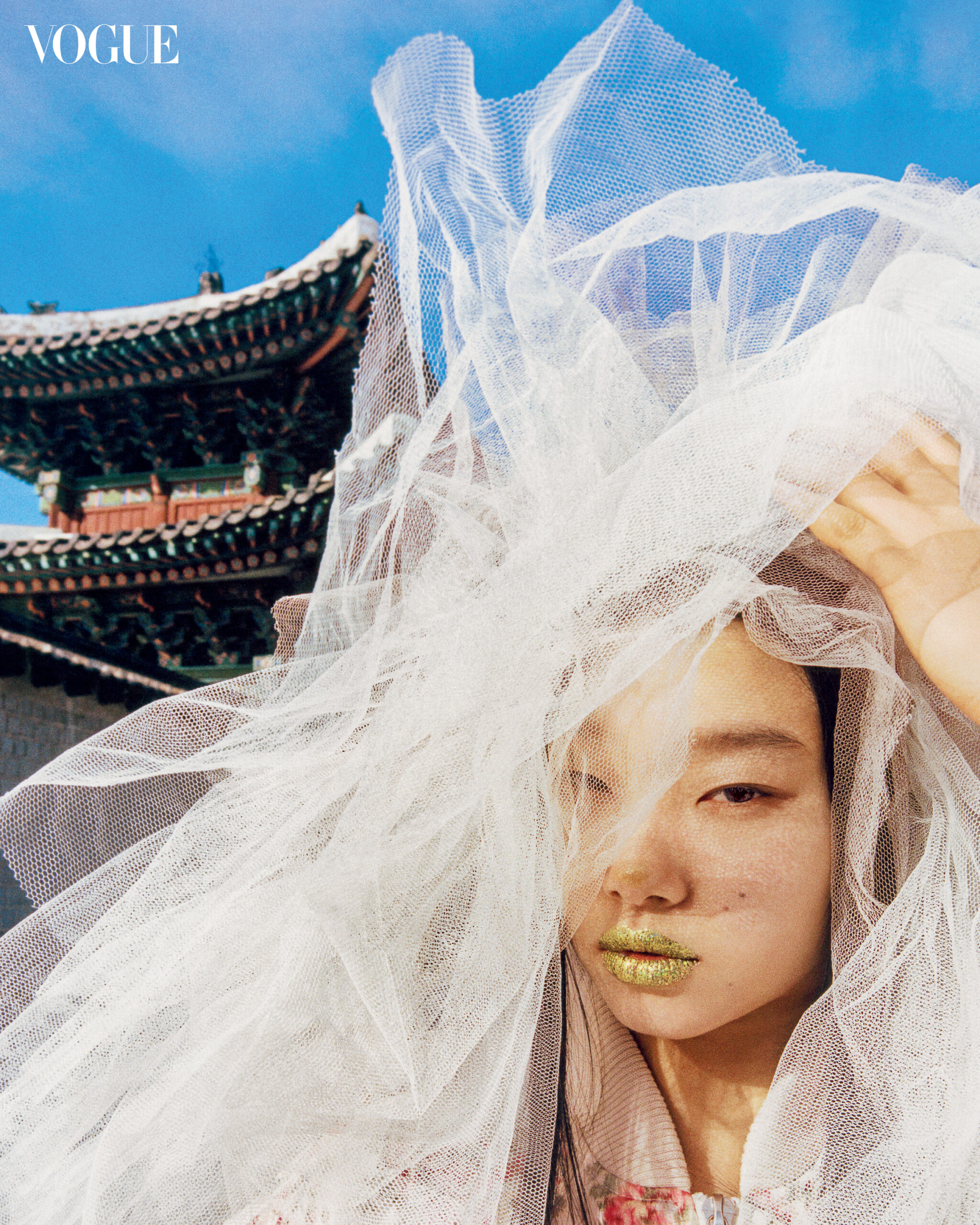
At Changgyeong Palace, Bae peeks out from the romantic abundance of her Simone Rocha jacket (simonerocha.com) and veil. Photography by Cho Gi Seok
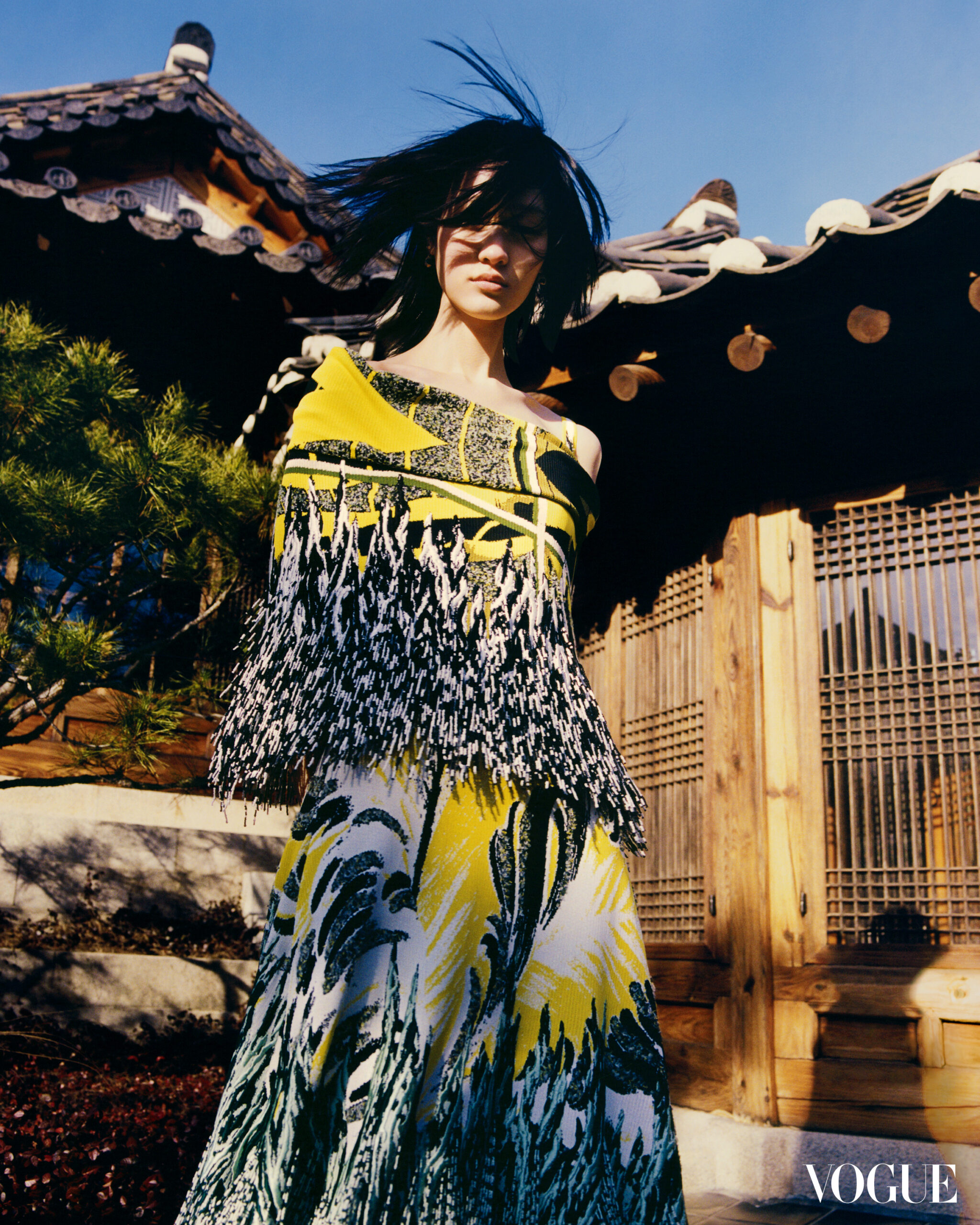
Even as the traditional Korean houses, or hanoks, that contain the Korea Furniture Museum’s vast collection let viewers imagine how pieces existed in situ, Oh’s graphically printed, stunningly textured Bottega Veneta dress (bottegaveneta.com) feels rooted purely in the here and now. Photography by Cho Gi Seok
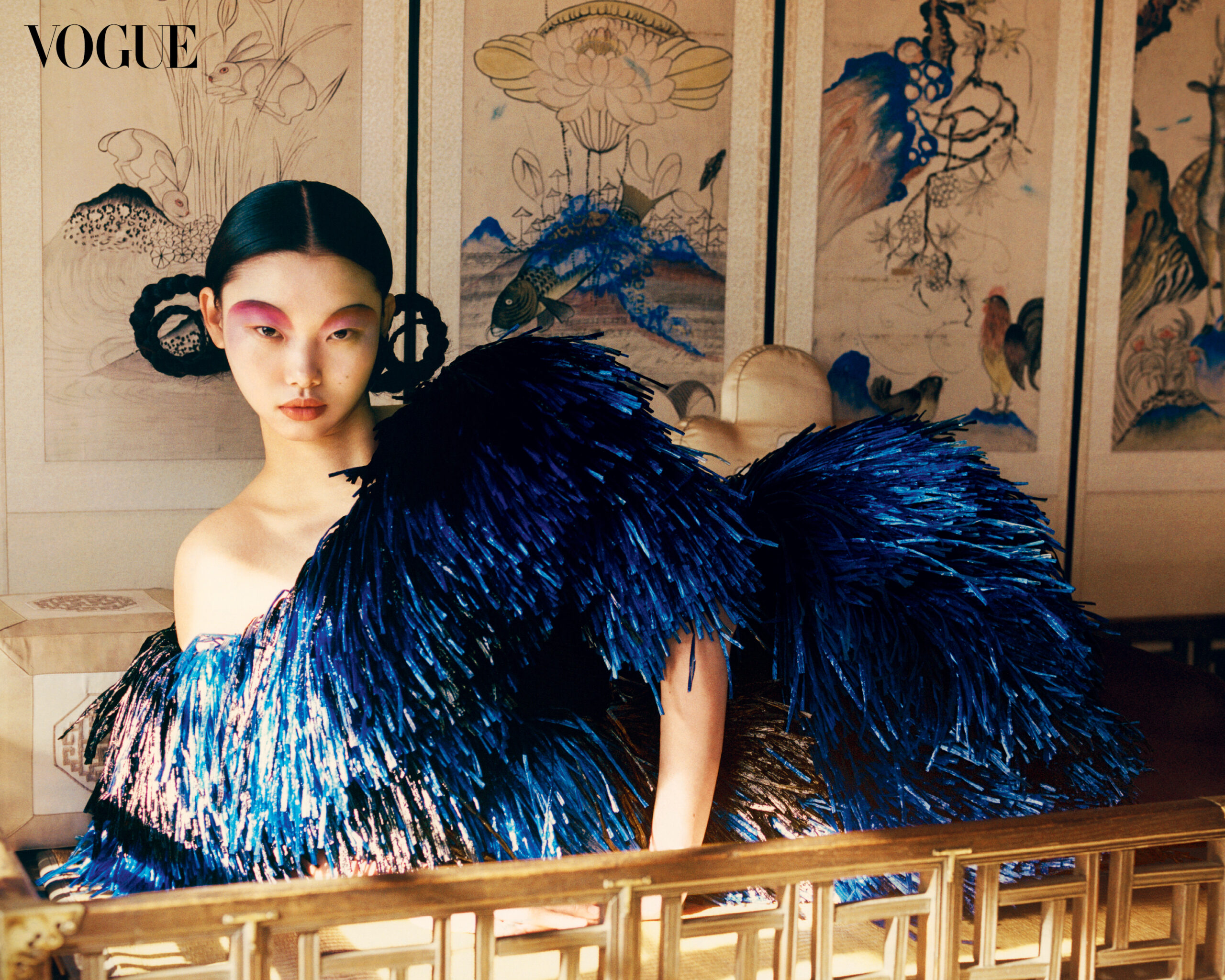
As striking in color as it is in silhouette, Bae’s Alexander McQueen dress (alexandermcqueen.com) can’t help but make an already sumptuous setting even more special. Photography by Cho Gi Seok
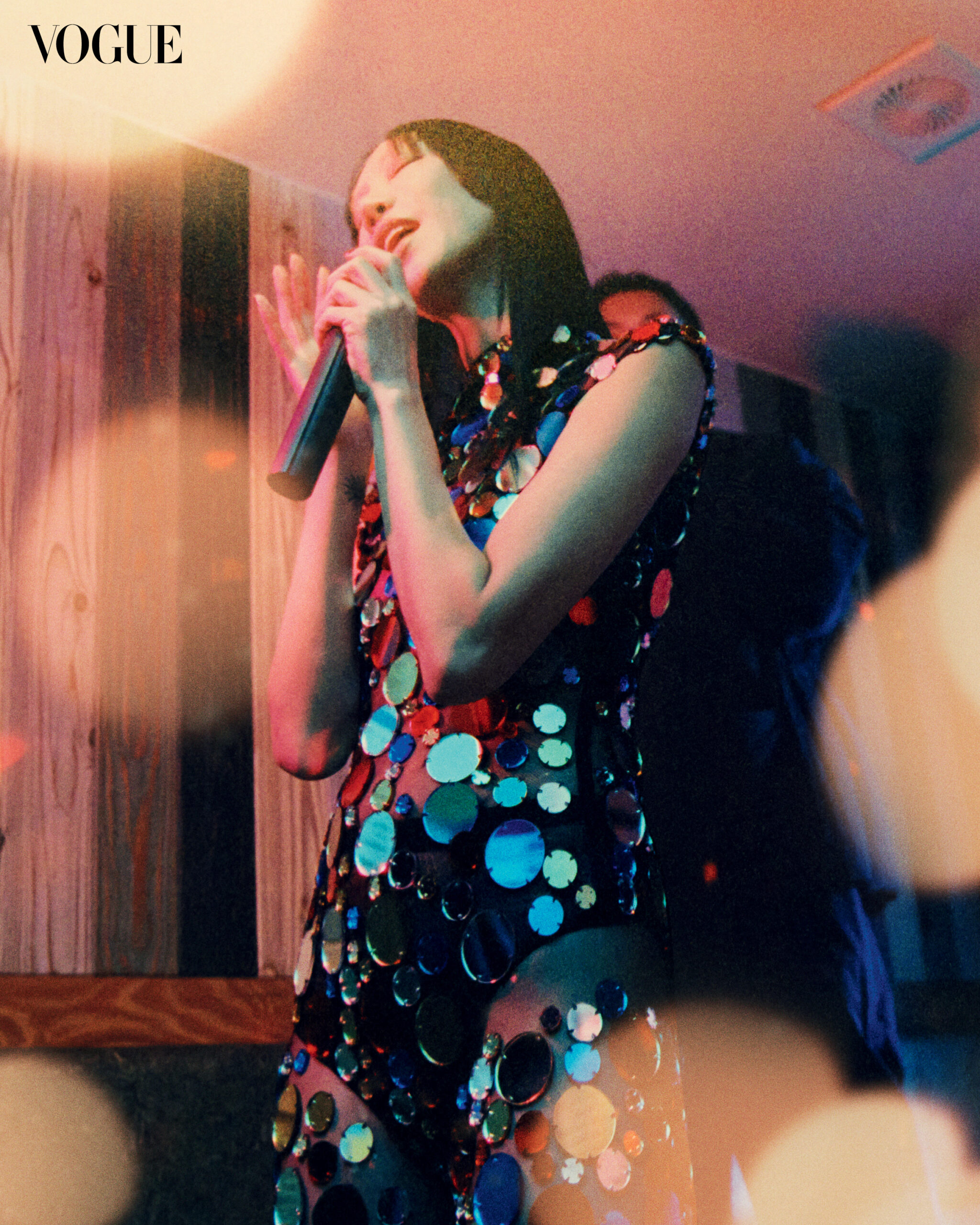
Model and singer Soo Joo Park—who releases dream pop under the name Ether—faces the music in a gleaming Alaïa bodysuit and leggings; maison-alaia.com for information. Photography by Cho Gi Seok
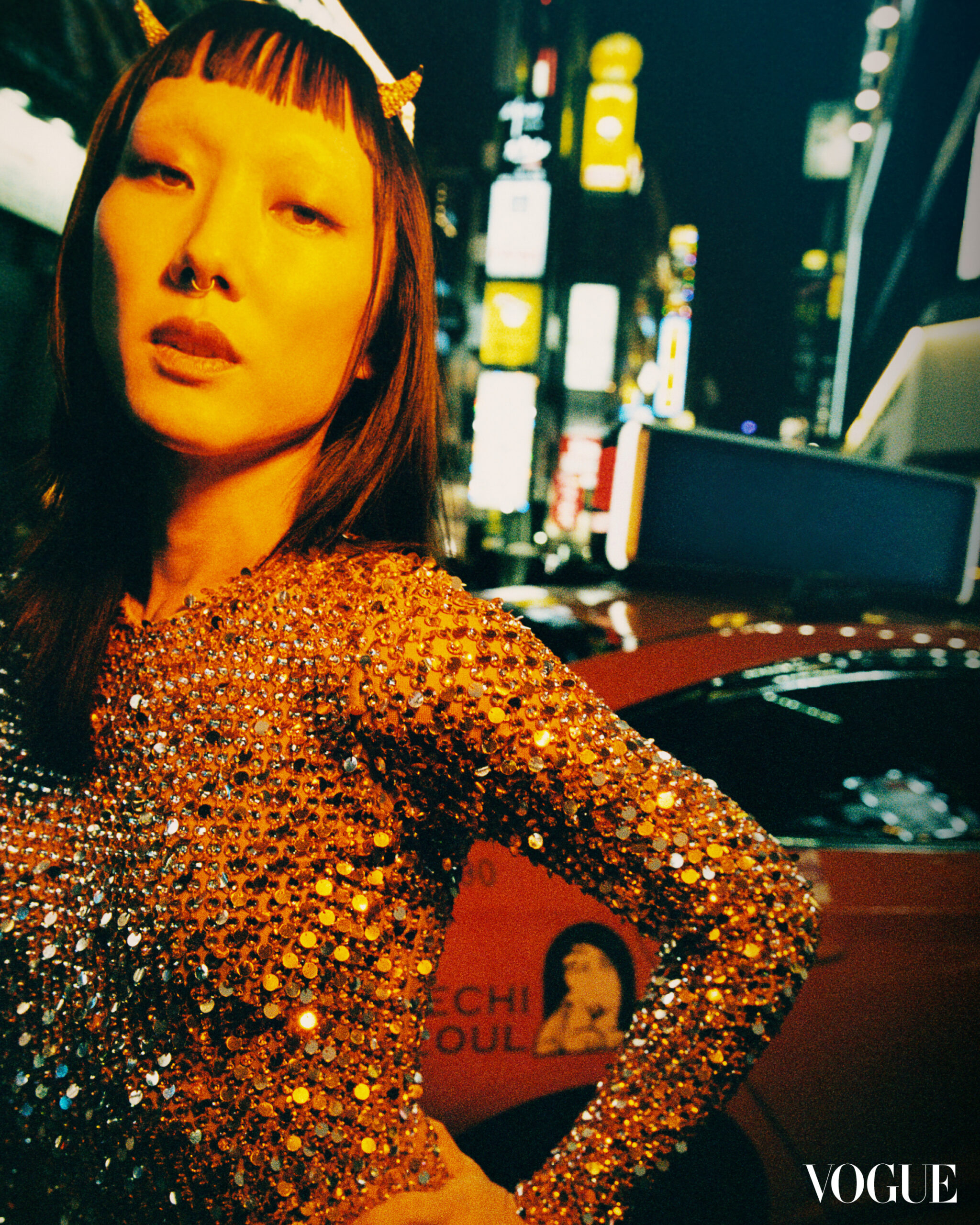
Activist and performer Jungle wanders down the Jonggak Avenue of Youth in a Valentino jumpsuit; Valentino boutiques. Photography by Cho Gi Seok
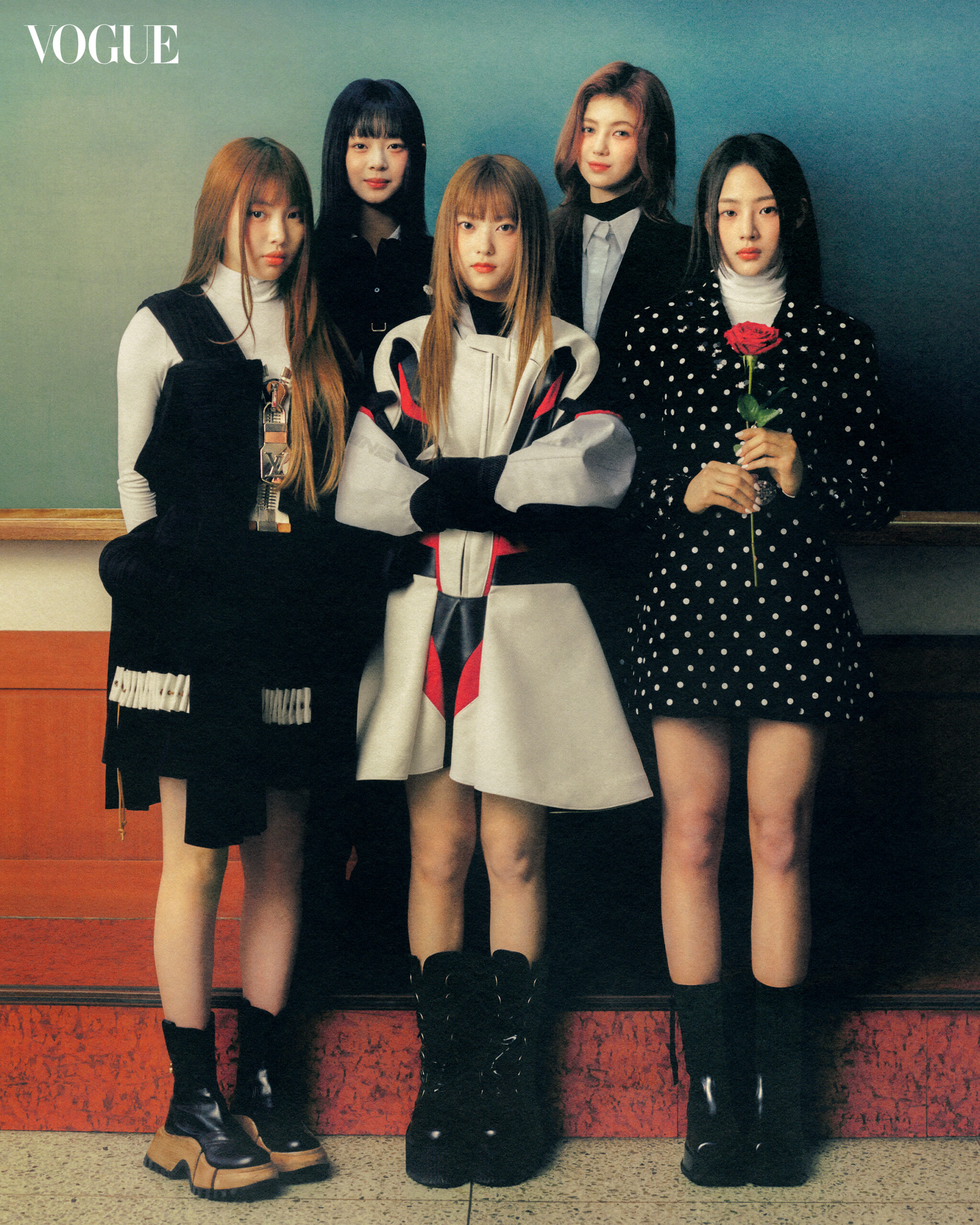
The rising idol group NewJeans is setting the pace in K-pop. From left: Hyein wears a Louis Vuitton dress; select Louis Vuitton boutiques. Hanni wears a Münn bodysuit; Harvey Nichols. Haerin wears a Junya Watanabe jacket; shop.doverstreetmarket.com. Danielle wears a Michael Kors Collection dress; michaelkors.com. Minji wears a Chanel jacket; select Chanel boutiques. Photography by Cho Gi Seok
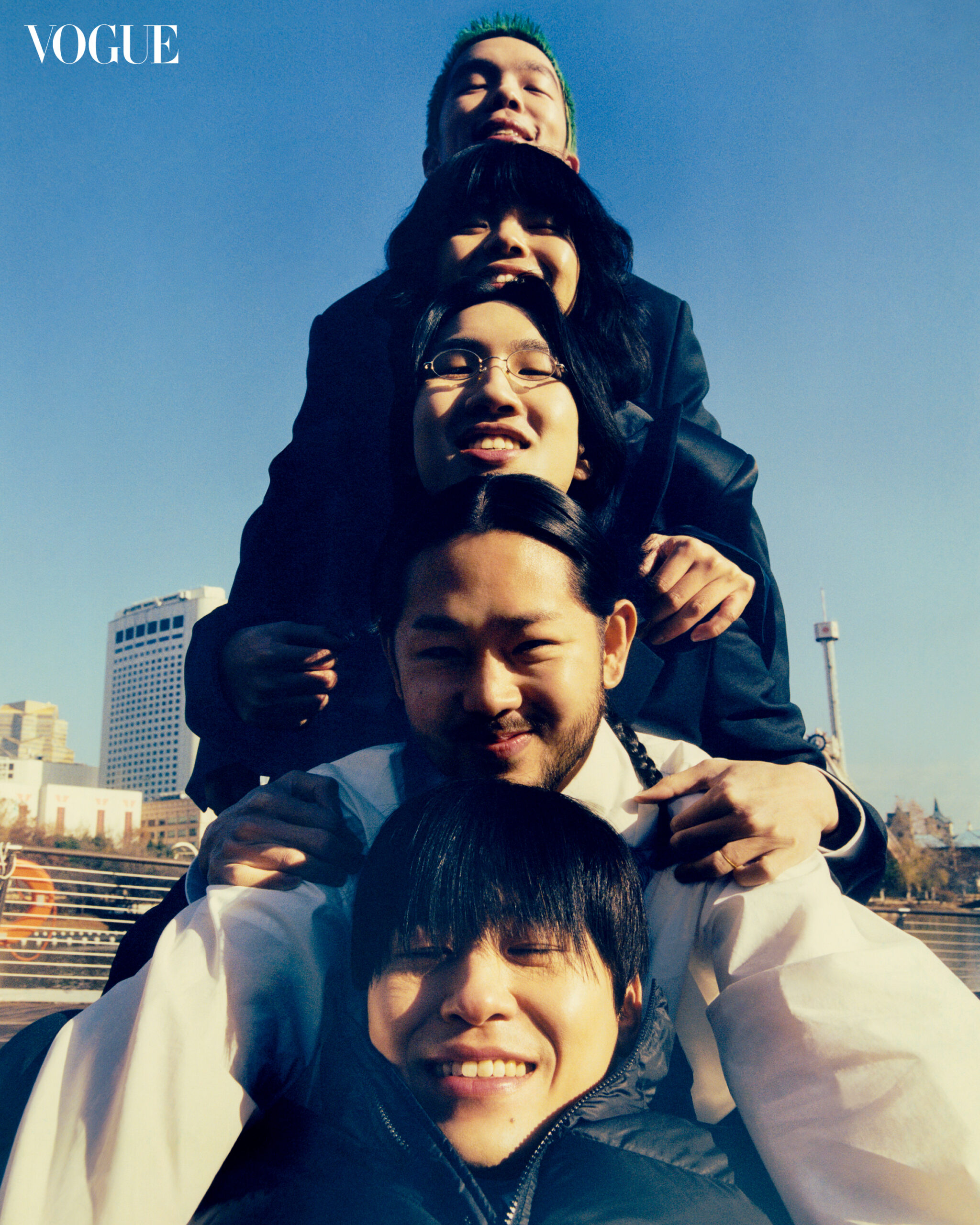
From top: Omega Sapien, Mudd the student, Chanhee Hong, Leesuho, and bj wnjn of the K-pop collective Balming Tiger, in Prada and Louis Vuitton. Photography by Cho Gi Seok
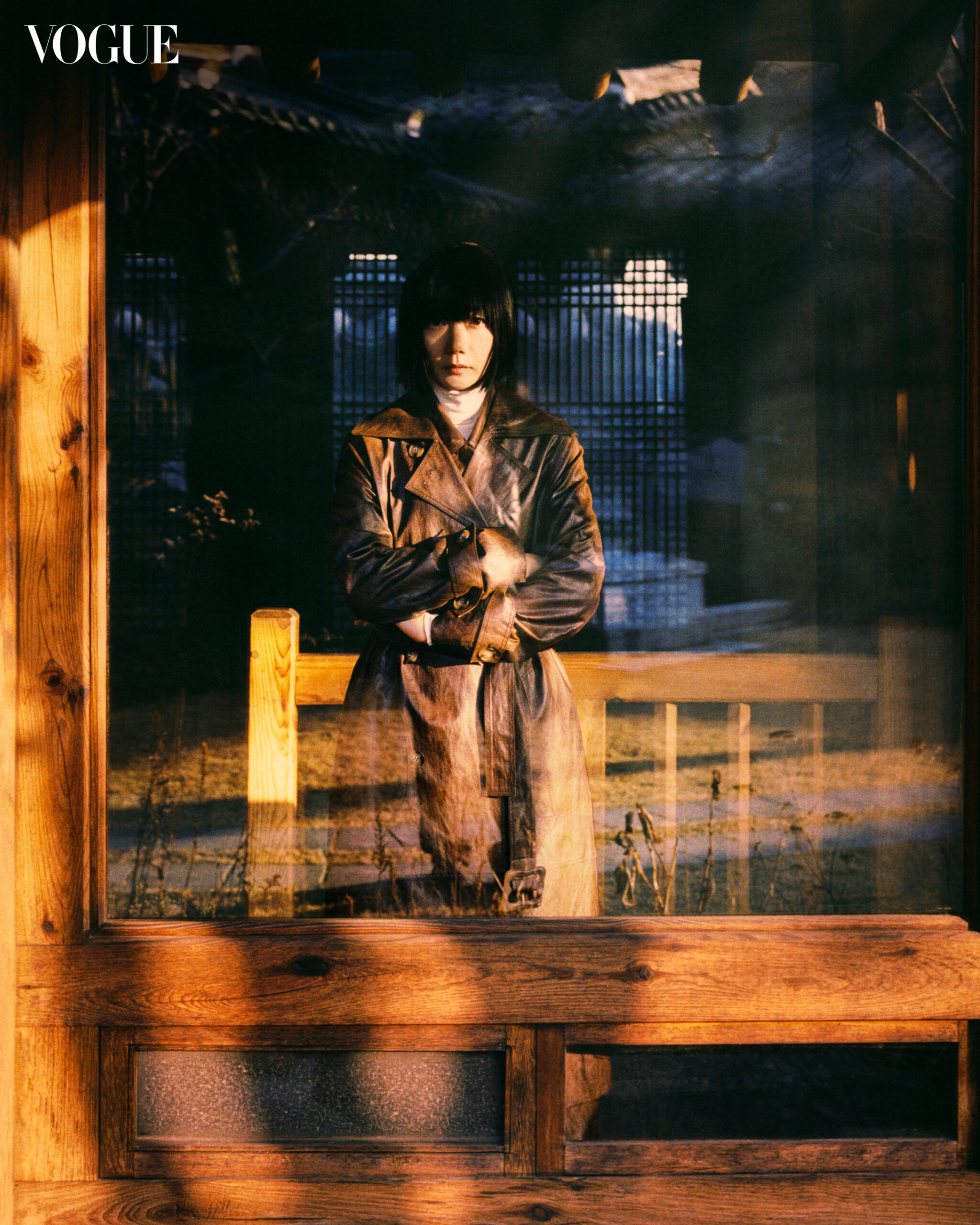
Known for her work with directors such as Bong Joon-ho, Park Chan-wook, and Hirokazu Koreeda—including in 2022’s Broker—actor Doona Bae goes elegantly incognito in a Rejina Pyo trench coat; rejinapyo.com. Photography by Cho Gi Seok
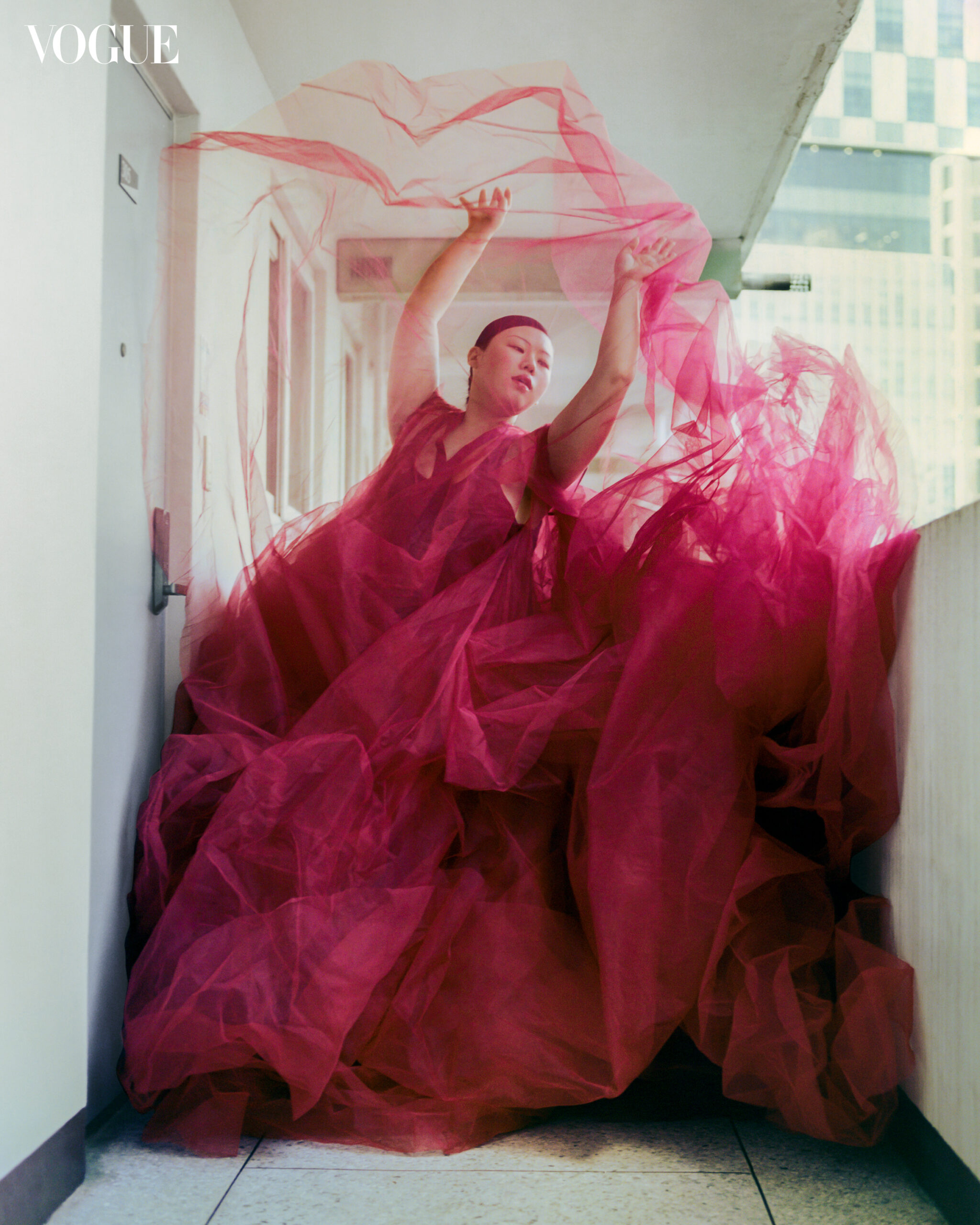
Here, she makes a wonderful scene in a Rick Owens mantle and tank top; rickowens.eu. Photography by Cho Gi Seok
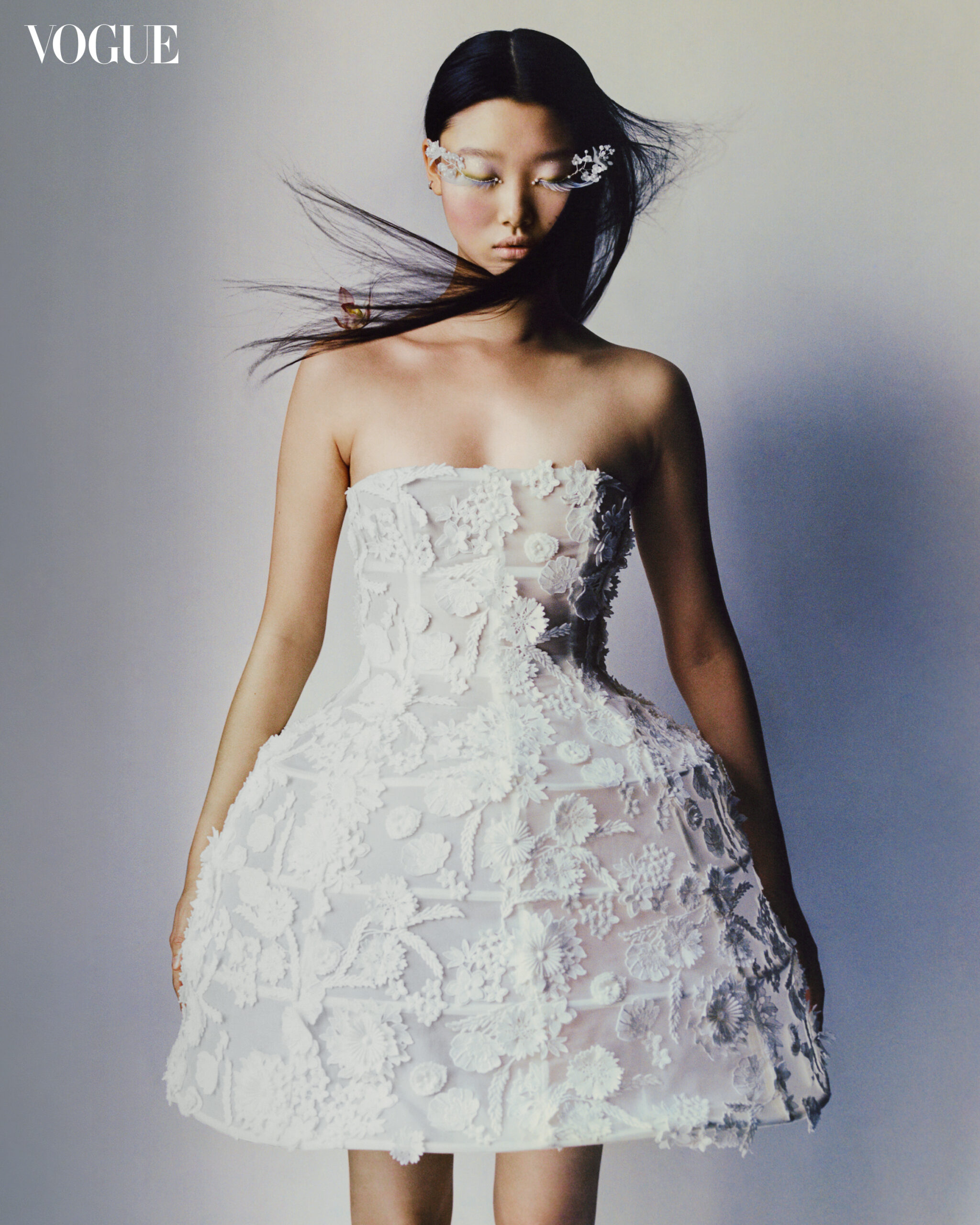
Bae wears custom wire-pearl and lace lashes designed by makeup artist Seongseok Oh and a Dior dress; by special order. Photography by Cho Gi Seok
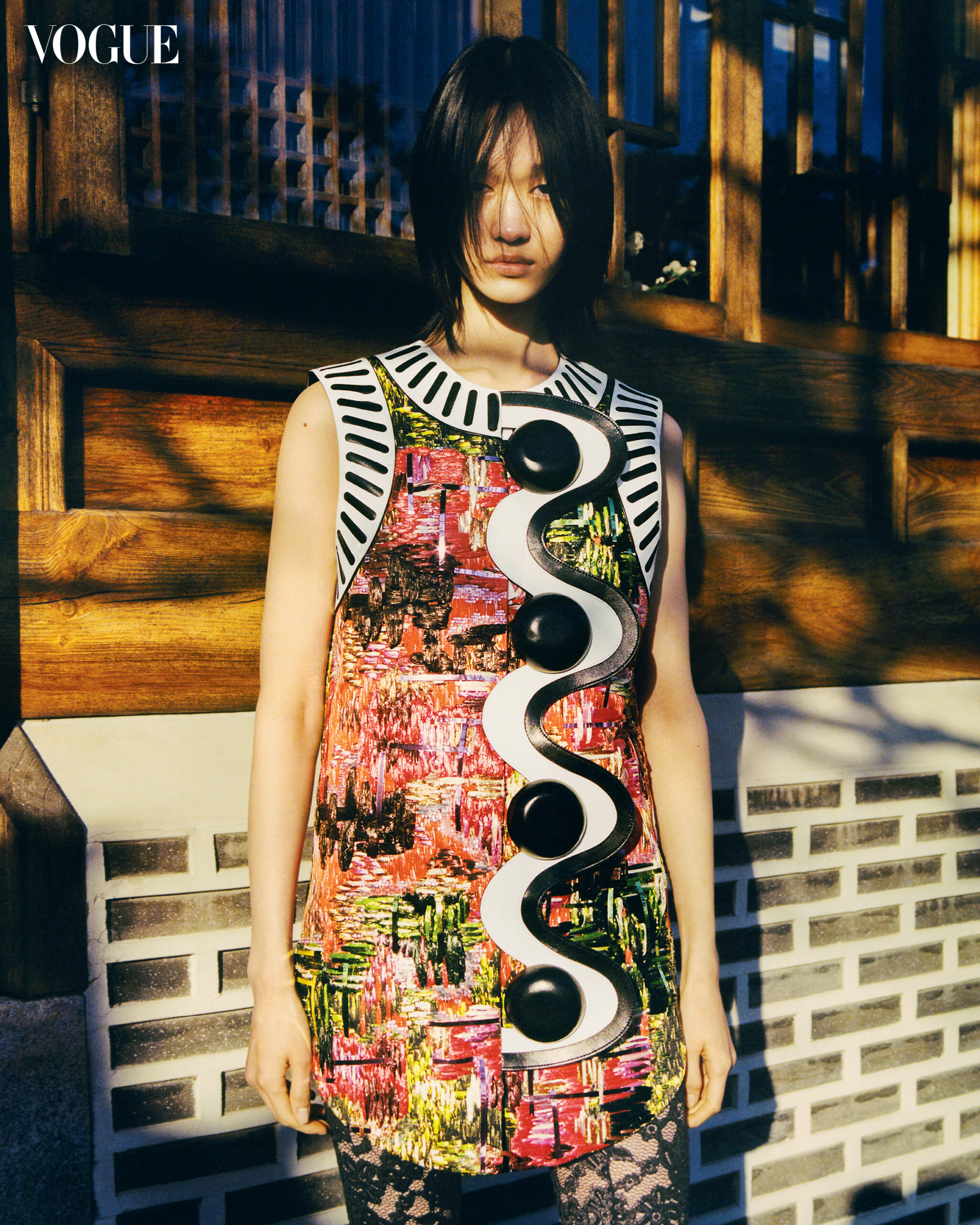
The visual vim of Oh’s Louis Vuitton dress (select Louis Vuitton boutiques)—all bold tones and artfully clashing prints—calls to mind nothing so much as the heady mood of 21st-century Seoul itself. Photography by Cho Gi Seok
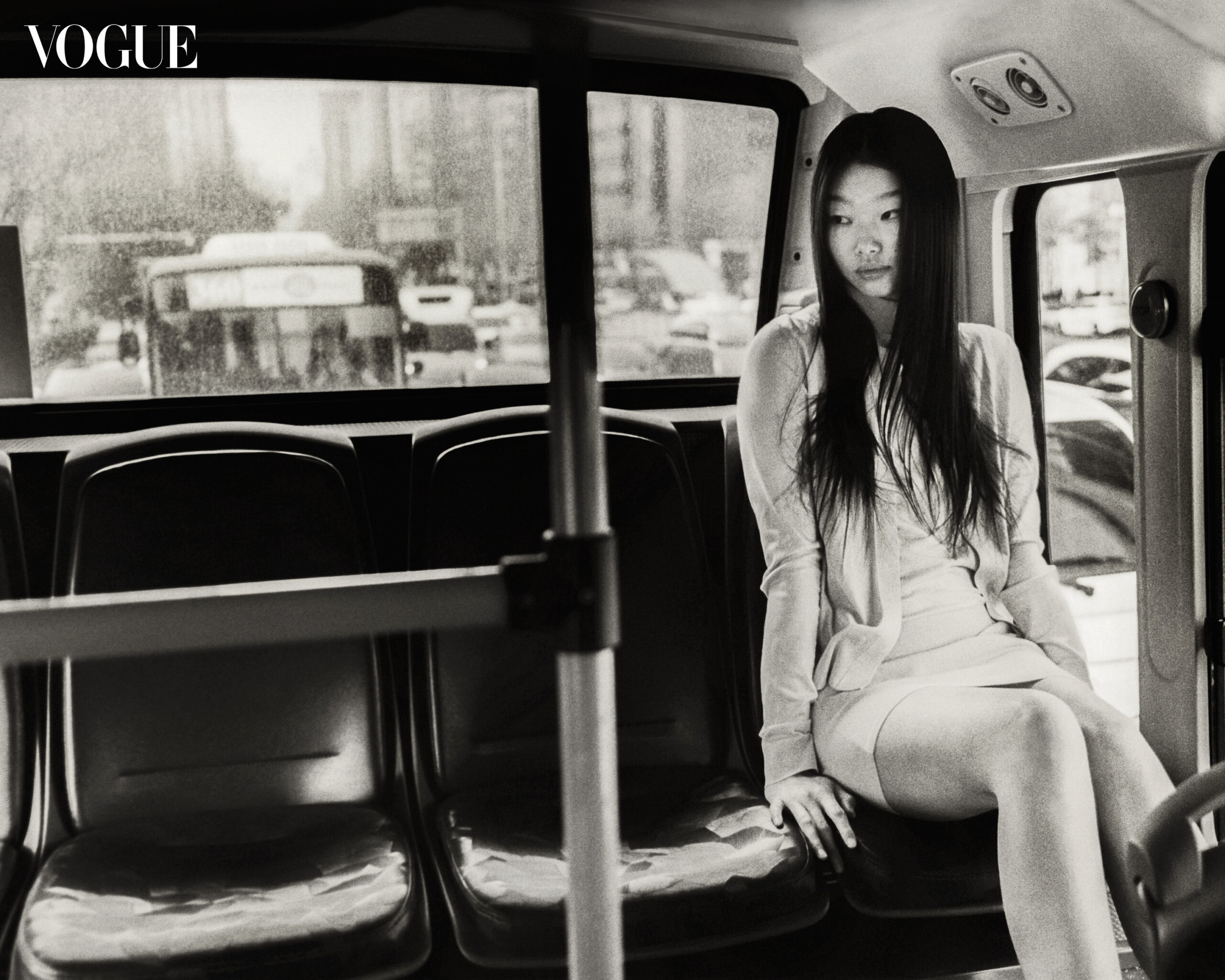
However you get from here to there, make like Bae and consider a little white dress and matching cardigan, all courtesy of Fendi (fendi.com), for your next go-go-go day out. Photography by Cho Gi Seok
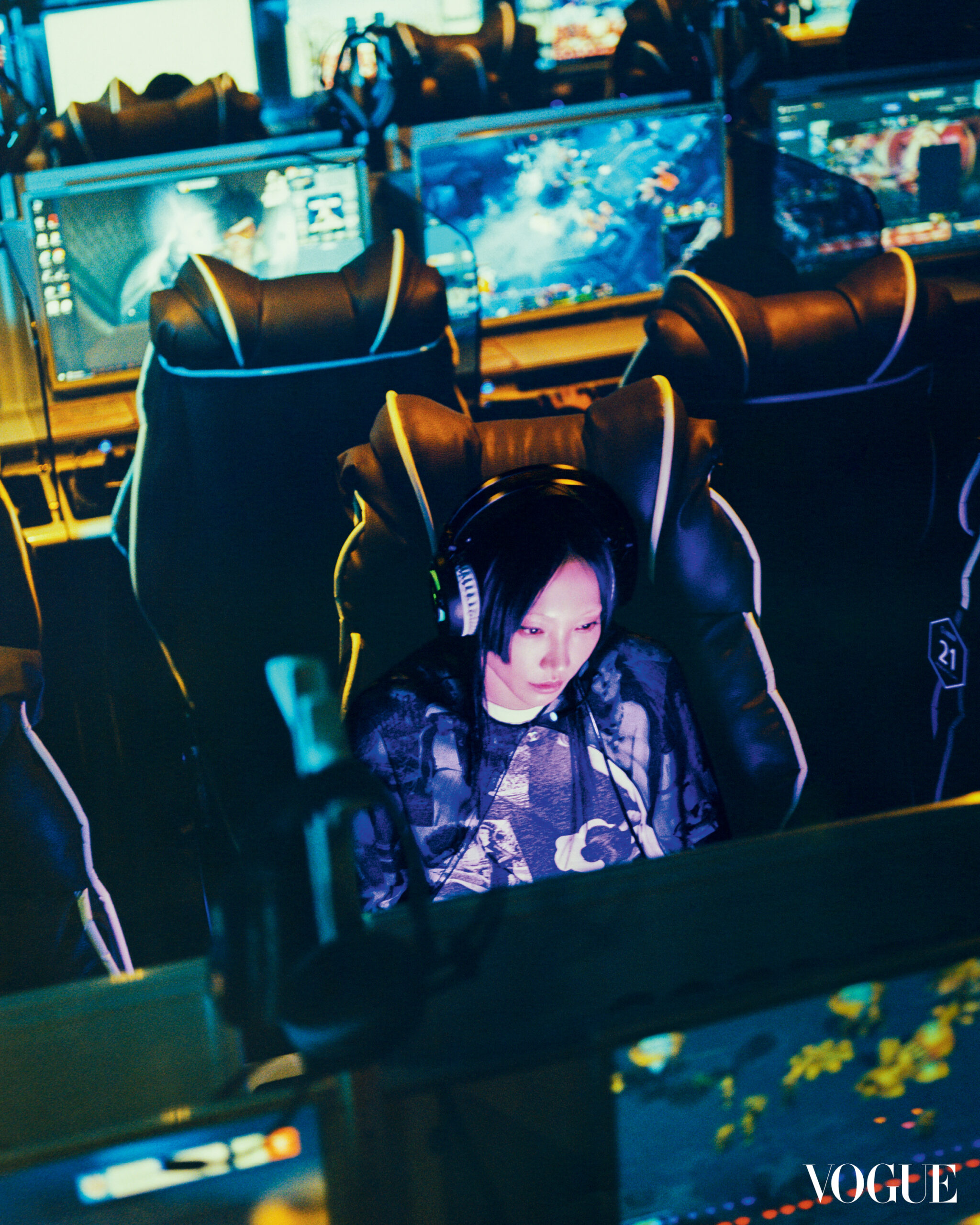
At Indigo PC Room in trendy Seongsu-dong, Park enters boss mode in a Chanel cape and T-shirt; select Chanel boutiques. Photography by Cho Gi Seok
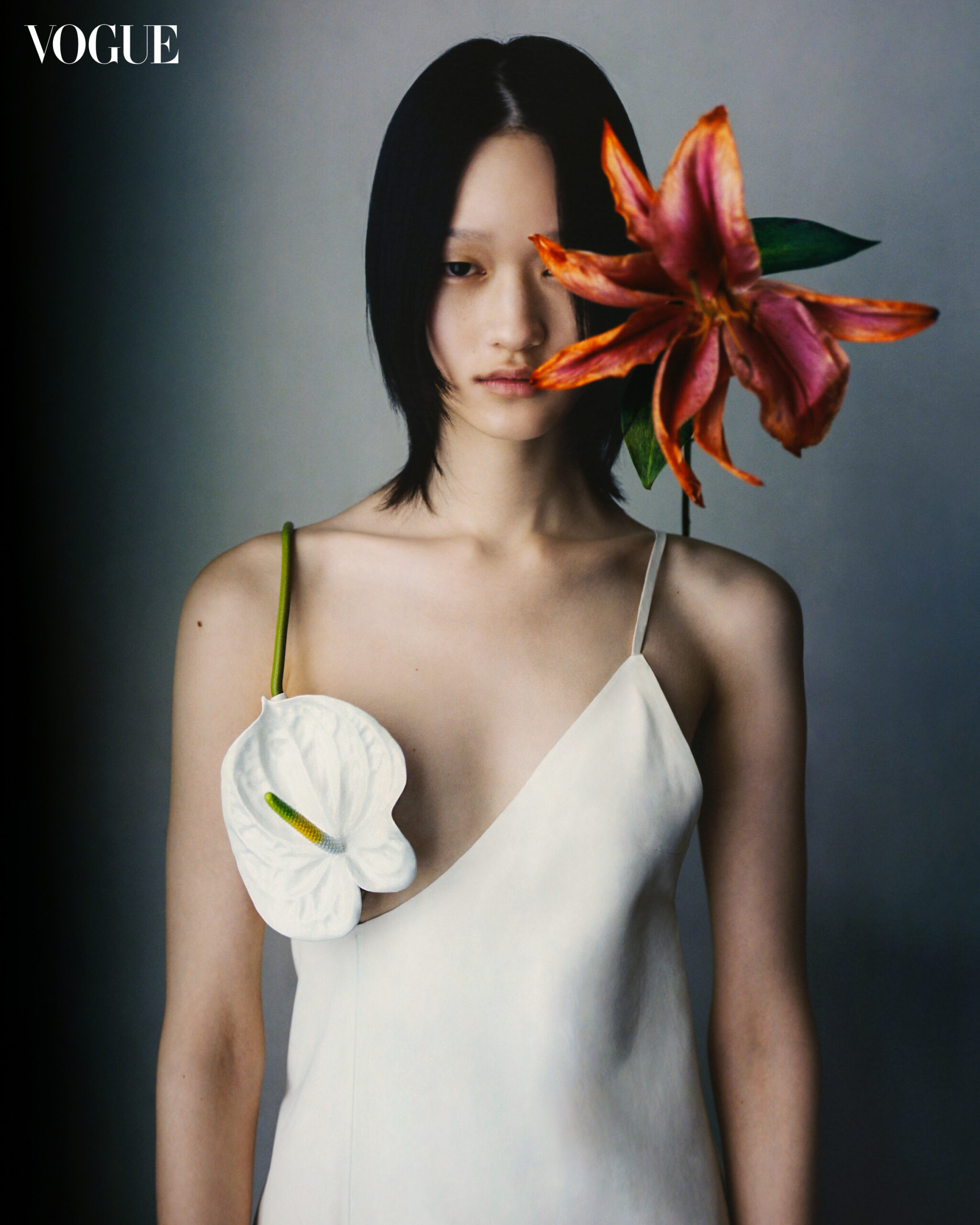
Oh wears a garden-fresh Loewe dress; loewe.com for similar styles. Photography by Cho Gi Seok
In this story: hair, Gabe Sin; makeup, Seongseok Oh.
